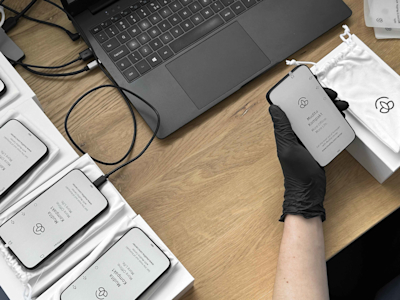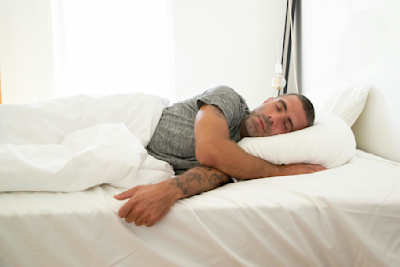
5 reasons to switch to an alarm clock
It's time to kick your smartphone out of the bedroom & replace it with an alarm clock!
Why are alarm clocks better than phones?
The reality of life in the 21st century is that we basically wake up and go to sleep with technology. We work with technology, play with technology, socialize with technology, drive with technology, and even come home to watch technology.
Yes, technology has become so integrated into our everyday lives that our smartphones, tablets and even our fitness trackers and smartwatches are now able to send and receive text messages and emails, make calls and keep us occupied with constant disruptions, reminders and notifications. Using your phone as an alarm is not only unnecessary, it can not only be detrimental to your overall health and well-being, but also to personal growth.
Before you are tempted to use your smartphone as an alarm clock, consider all of the negative ramifications that doing so can have.
Sleeping issues
We can all agree that sleepless nights can take a toll on our energy, productivity, mood and overall quality of life. Waking up groggy and tired can definitely ruin not only your morning, but sometimes even your whole day. If you’re like most people, the last thing you probably look at before going to sleep (and the first thing you see upon awakening) may be your smartphone.
It may be tough to stop and put the device away. This alone may lead to a delay in bedtime and reduced total sleep time. This may contribute to sleep deprivation if the needed hours of sleep to feel rested are not obtained. The stimulation may make it hard to shut down and fall asleep. The mind may be overly excited or activated. [1][2]
Stress
Your phone is a repository of your inboxes, to-do lists, projects, and problems. Even prior to the massive shift to remote work, and even more so now, proving that you can stay productive and perform at high levels of efficiency is considered the norm. Consequently, you’ve probably found yourself glued to your smartphone at all hours, checking your phone for Slack messages and answering emails when you should be sleeping, just to make sure you stay on top of things. Then, when you do finally get to bed at the end of your day, you’re likely using your smartphone to catch up with friends and scroll through social media to see what's going on. All this stimulation and distractions at night, when you should be winding down, relaxing and getting ready for sleep, raises cortisol levels, therefore increasing stress.
EMFs
According to sleep expert Martha Lewis, electromagnetic fields from our smartphones, Bluetooth devices and WiFi connections may interfere with your sleep and contribute to insomnia by disrupting your sleep cycles and contributing to poor sleep quality. Studies have also shown a link between continuous and persistent EMF exposure and circadian rhythms. [3][4]
FUN FACT: EMFs are the reason why we are required to put our mobile phones in flight mode when we are traveling on an airplane. This is because EMFs can interfere with the flight navigation systems.
Blue Light
The blue light from your smartphone, tablet, or computer screen may negatively impact your ability to fall asleep. Even small amounts of artificial blue light from the screens affect melatonin production and disrupt your circadian rhythm. To avoid impacting your sleep cycle negatively, turn off the electronics at least one or two hours before going to bed.
Brain Clutter
We're inundated by alerts, notifications and disruptions from our digital devices all day long. For those who sleep with or next to their smartphone, that pattern continues all throughout the night. With coworkers in different time zones and friends on different continents, it’s easy for our screens to fill-up with interruptions at all hours of the night. Although you might think this is harmless, because we want technology to help us navigate our busy lives; however, these constant alerts not only activate our stress hormones, they create an environment in which our brain can never fully disconnect from this constant stimulation in order to fully relax and unwind. This is because we’re always hyper-vigilant, not wanting to miss important messages or get caught off-guard in an emergency. Attention is a limited resource. There is just a finite amount of stimuli that you can handle at any given moment. Keeping your smartphone within reach during bedtime ensures that your brain is always cluttered with information at a time when you should be relaxing.
Make the Switch
Establishing healthy bedtime habits begins with preparing an optimal sleeping environment. Instead of depending on your smartphone to wake you up in the morning, switch to a more traditional alarm clock, such as Mudita Harmony or Mudita Harmony 2. For an even more simplicity and tranquility, consider adding an analog alarm clock, like Mudita Bell or Mudita Bell 2, to your bedside. This way, you can rest easy knowing that alerts, EMFs and blue light, and information overload won’t interfere with your sleep quality.
Choosing a traditional alarm clock, which intentionally moves us away from ever-present screen time, allows us to truly relax and unwind, so that we may get a proper, restorative night of sleep.
If you’d like to read more about topics connected to this subject, please check out some of our other articles published on our blog:
You might also like to join our FORUM Community where we discuss ideas and exchange information about all things connected to wellness and overall health & well-being.
Related stories

It’s Happening! Mudita Kompakt Has Started Shipping!
It’s happening! Mudita Kompakt has officially started shipping. The first phones are on their way to backers. Get all the exciting details in our latest update.

Mudita Kompakt wins Red Dot Award 2025 in Product Design
Mudita Kompakt wins the Red Dot Award 2025, its second major design honor. Shipping begins soon, with Global and North American versions on the way .

How a Consistent Sleep Schedule Contributes to Longevity?
A consistent sleep schedule boosts longevity, supports heart health, and enhances brain function. Learn how better sleep can lead to a longer, healthier life.
If you'd like to receive the best stories from our blog, keep up to date with our progress and get notified about our product releases and special discounts.